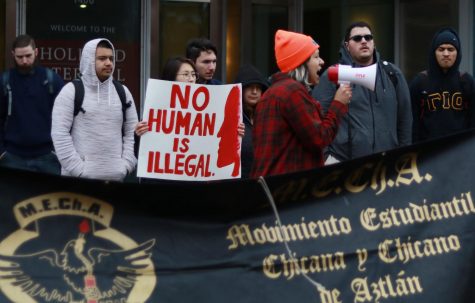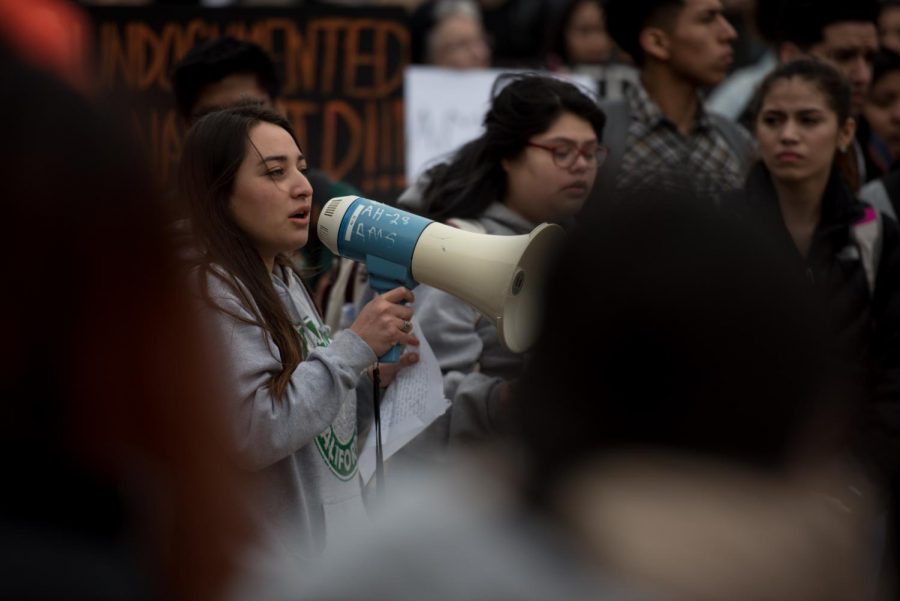Take to the streets for Clean DREAM Act
We must offer our voices to amplify the demands, needs of fellow students
LUKE HOLLISTER | Daily Evergreen File
Celeste Estrada recounts to gathered students how she was unable to attend her father’s funeral due to her undocumented status.
February 22, 2018
Celeste Estrada’s parents brought her to the U.S. when she was a child to help support the family. They had a business that wasn’t making enough for them to thrive, and the U.S. was the best way to help make ends meet. But it was a tough road. Her father struggled with depression and alcoholism, and eventually passed away from alcohol poisoning.
“He was depressed all the time because he was separated from his family in Mexico,” said Estrada, a Deferred Action for Childhood Arrivals student. “When he was deported, he became even more depressed.”
After losing her father, Estrada was unable to attend his funeral in Mexico at the risk of being unable to re-enter the country. She could have applied for an option called advance parole, but this was not communicated to her until it was too late.
The Trump administration has since eliminated this opportunity. And now there’s even more at stake for DACA recipients like Estrada.
DACA allows children who are immigrants the opportunity to gain jobs and receive government aid toward their education. This program would also give them a better chance of getting a green card. However, it only lasts two years, and then a new permit must be obtained. The Trump administration has recently stopped DACA renewals and is no longer accepting applications.
On March 5, Congress will decide the fate of all DACA recipients when it proposes the new Clean DREAM Act. The act is a spinoff of the original DREAM Act created during the Obama administration, which allowed undocumented immigrant children in the U.S. a way to gain citizenship. The original act, however, did not make it past the Senate and fell out of existence.
The Clean DREAM Act is an even stronger attempt at allowing DACA recipients a permanent solution to living in the U.S.
Brenda Rodriguez, a senior DACA student, came to the U.S. when she was 9, the last one to join her family. She said she vividly remembers walking through the desert to get here. DACA has helped her acquire jobs that have supported her through school from community college to WSU.

Brenda Rodriguez, a student activist and DACA recipient, leads a rally to show support of the Clean DREAM Act.
Instead of making DACA members renew their status every two years, the Clean DREAM Act puts the DREAMers on a path to official citizenship, providing them with the full opportunity that we as U.S. citizens take for granted.
Congress has yet to find a compromise. But while they are deciding, what is going to happen to the DREAMers? If history is any indication, we might end up repeating our mistakes.
While the U.S. is the product of immigration, it remains afraid of social change brought on by different cultures and ideas. America has hated, feared or denied almost every culture at some point, and the modern day is, unfortunately, no exception.
This mindset is the opposite of the idea the U.S. seemingly takes pride in: America as a land of opportunity and a sanctuary for those who need it.
Everyone has learned to hate and fear each other, leading to the denial of the freedoms we value. Not only that, our economic communities are supported by immigration. Socially, we are denying ourselves the diversity that immigration brings, and the cultural understanding and benefits that come with it.
But this shouldn’t even be about us. It should be about the guiltless people raised here just as we were. The people we would be screwing over completely. Other than their status, there is no difference between them and us. They are raised to know their native cultures at home, just as much as we keep our own cultural and family traditions. My German family still follows our roots in our meals and celebrations — including St. Nicholas’ Day and an enormous consumption of sauerkraut.
Yes, these immigrants have another home outside the U.S., but they call this country home as well. For many of them, it’s all they know.
“Our hearts are split in two,” Estrada said. “I am not either country; I am both.”
Immigration has brought countless advances, both scientific and cultural, to America. According to the national foundation for American Policy, immigrants have been awarded 39 percent of the Nobel Prizes won by Americans in Chemistry, Medicine and Physics since 2000. But students shouldn’t have to win Nobel Prizes to be worthy of citizenship.
“We are still important to this country even if we don’t want to be a doctor or a CEO,” said Maximiliano Mardrigal, a freshman DACA student. “Getting rid of us won’t fix the U.S.’s problems. We still deserve a chance to live out our dreams.”
Many children will find their DACA permits expiring before the date of the decision, others not long after. If there is a delay in decision, even more DACA recipients will be affected. The 800,000 permits issued allow them to obtain jobs, receive financial help for schooling and apply to colleges. Taking this away would not affect their status as students, but financially, the blow would be devastating. The discomfort of looming deportation would make psychological matters much worse.
“I worry about the increase in fear in our communities,” Estrada said. “It will hurt our mental health. Once the DREAM Act wasn’t passed, a lot of DREAMers committed suicide. The thought of our lives always being in limbo makes many of us believe there is no point in continuing on because there’s no opportunity to prosper.”
But we are the generation that can change that. We have voices, and we need to get over the idea that we don’t need to use them. We very much do. The 2016 election was a hard lesson in this.
The original DREAM Act was the result of the pressure undocumented children put on legislators, just like DACA. Backing from U.S. citizens was minimal, but increased support could make significant change.
We have an opportunity to raise our voices in support of these classmates, friends, roommates and fellow humans who are working hard to be heard. As U.S. citizens, we can amplify these voices and use our own statuses to build a stronger platform on which they can stand.
“It’s not just the DREAM Act,” Rodriguez said. “It’s Celeste, it’s Brenda, it’s Max. We’re putting ourselves, our bodies, our energy into putting in the labor for this act, and it takes a toll.”
We should be out on the streets with them, protesting, calling representatives and demanding that these individuals be afforded the same rights and treatment U.S. citizens have.
They should not be alone in fighting their battles — the U.S. was built on this concept. Remember that.
If you or someone you know is feeling suicidal, please contact:
– National Suicide Prevention Lifeline: 1-800-273-8255
– WSU Counseling, Psychological Services: 509-335-4511
– WSU after hours: 509-335-2159










